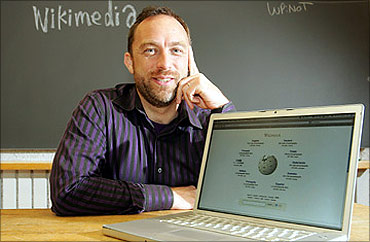Photographs: Courtesy Wikipedia Ufaque Paiker in Mumbai
Ask a school-going child where he gets his research information from and the answer will, in all probability, be Wikipedia.
No wonder then, Jimmy Wales, founder of the popular online encyclopaedia service, is all smiles.
Wales, who was in Mumbai on October 31, is full of excitement over the increase in Wikipedia's popularity in India.
He talks about the staggering increase both in the number of Internet users and Wikipedians in India. "There are 81 million Internet users in India; 191 million pages are viewed per month and 90,000 pages are edited in India."
Which is why Wikipedia is setting up its second office, its first outside the United States, in India. "I don't know where the office is going to be," he says. "It will be a surprise for me as well. It will have three to four people who will chalk out the plan to interact with more number of people."
More videos:
India: Wikipedia's newest target
Why people are addicted to Wikipedia
Wikipedia, now in Marathi
Image: Jimmy Wales in Mumbai
His goal is to make Wikipedia available in India's local languages. "If we can actively energise the community, it can take off quickly," he says. "Marathi and Telugu, for example, are catching up fast but Punjabi, which has a good number of speakers, is lagging behind."
Wikipedia's biggest need, he says, "are active, vibrant community editors. Eighty one per cent of the edits that happen are in English. But the numbers are dropping, which means other languages are growing. The growth of local language edit is exciting."
Local languages, he says, will lead the way to future growth. His strategy includes working through "university clubs, schools, knowledge sharing through annual conferences and regional meet-ups to expand Wikipedia in local languages."
He adds, "By 2015, the top edit in Wikipedia can be in local languages which will cover 80 per cent of population. However, this is a ridiculously easy goal. We can easily surpass this." After all, he says, if Wikipedia were a country, "it would be the world's largest country."
Video: Afsar Dayatar/Rediff.com


article